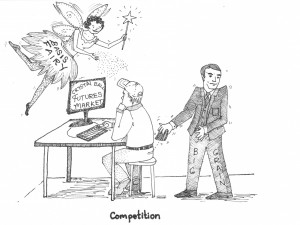(August 11, 2016) With prospects of another bumper crop, the Saskatchewan government is laying the groundwork for a “blame the railways narrative” with its recent news release titled “Joint Efforts Ensure Grain Transportation System Is Prepared to Move Harvest.”
The Saskatchewan Government is pretending that setting up talking shops with no regulatory power will somehow move the giant grain handling companies to give up their profits for the benefit of farmers. The unbalanced approach of the Sask. government can be seen in their willingness to interfere in the collective bargaining rights of port workers while turning a blind eye to the defective market structure which allows the grain handling companies to arbitrarily choose how much they will pay farmers for their grain.
After the marketing debacle of 2013-14 the Harper Conservatives attempted to cover up the consequences of killing the logistical influence of the farmer-owned and controlled Canadian Wheat Board on grain marketing by painting the railways as the scapegoats for the mess. In fact it was the private grain handling companies that were taking excess profits from farmers during the bumper crop year of 2013-14 and blaming the railways.
However the Canadian Transportation Agency’s December 2014 determination of the Maximum Revenue Entitlement (MRE) – commonly known as the “rail cap”-, showed that narrative was false. In fact that bumper crop was moved very efficiently. The CTA reported that rail movement increased almost 19% that crop year in response to a crop about 25% above the previous year (see: Agriculture and Agri-Food Canada, July 22, 2014 Outlook for Principal Field Crops).
The Agi-Food report also noted “low carry in stocks” which is a nice way of saying that 6% difference between production and rail grain hauling increases filled a grain pipeline that had been emptied as a result of the US drought the previous year.
Without the single-desk Wheat Board farmers are no longer shippers and it was the grain handling companies, not the railways, who increased their basis charges to cover up their excess profits taken at the expense of farmers. It was the grain companies who were having trouble meeting customer needs through effective management of grain delivery to their port facilities. CWBA noted in November of 2013 that “Competition creates chaos at ports.”
Given current predictions, we can expect a repeat of that this coming crop year. And for much the same reasons, as was said here.
The railways are constrained by the MRE from over charging grain shippers for transportation. However, the grain shippers are now almost exclusively the private grain trade and usually they own both the inland elevators and port terminals. Due to the distances between inland elevators they are not effectively constrained from taking excess profits from farmers who are captive to them. A bumper crop and the associated propaganda from the Sask. government and the trade will not change this fact.
 The government of Saskatchewan’s calls for greater transparency simply mask the fact the private grain trade is under no obligation to disclose port prices or the prices they are taking from customers around the world in any sort of timely fashion that would benefit prairie producers. Given the imbalance of market power between farmers and grain companies such transparency would make little difference at the farm gate in any event. Nor will it change the fact that without their single-desk Wheat Board farmers will once again watch world prices being diverted into the hands of the grain trade who now own the grain from the time it leaves the farmers’ trucks at the inland elevators.
The government of Saskatchewan’s calls for greater transparency simply mask the fact the private grain trade is under no obligation to disclose port prices or the prices they are taking from customers around the world in any sort of timely fashion that would benefit prairie producers. Given the imbalance of market power between farmers and grain companies such transparency would make little difference at the farm gate in any event. Nor will it change the fact that without their single-desk Wheat Board farmers will once again watch world prices being diverted into the hands of the grain trade who now own the grain from the time it leaves the farmers’ trucks at the inland elevators.
With yet another bumper crop in the offing, once again the ground is being laid to divert attention from the grain companies using their new found status as both the owners and shippers of wheat and barley for export to take more profits out of the system by using their market power to short change farmers.


